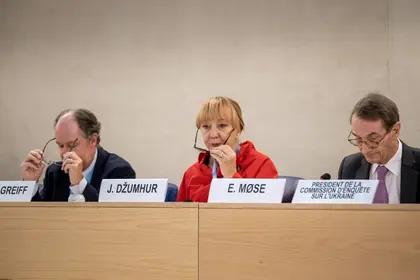UN investigators said Friday, Sep. 23, that war crimes have been committed during Russia’s war against Ukraine, listing Russian bombings of civilians areas, numerous executions, torture and horrific sexual violence.
“Based on the evidence gathered by the Commission, it has concluded that war crimes have been committed in Ukraine,” Erik Mose, the head of the investigation team, told the UN Human Rights Council.
JOIN US ON TELEGRAM
Follow our coverage of the war on the @Kyivpost_official.
The categorical nature of the statement was unusual.
UN investigators typically couch their findings on international crimes in conditional language, referring the final confirmation of war crimes and similar violations to courts of law.
The council was set up by the Commission of Inquiry (COI) — the highest-possible level of investigation — in May to investigate crimes in Russia’s war in Ukraine.
The team of three independent experts was presenting their first oral update to the council, after it launched initial investigations looking at the areas of Kyiv, Chernihiv, Kharkiv and Sumy regions, and said it would broaden the probe going forward.
Speaking a day before the seven-month anniversary of Russia’s invasion of its neighbour, Mose pointed to “the Russian Federation’s use of explosive weapons with wide area effects in populated areas,” which he said was “a source of immense harm and suffering for civilians.”

N. Korean Troops Massed in Russia to Enter Ukraine War ’Soon’: Pentagon Chief
– Torture, sexual violence –
He highlighted that a number of attacks the team had investigated “had been carried out without distinguishing between civilians and combatants,” including attacks with cluster munitions in populated areas.
The team, he said, had been especially “struck by the large number of executions in the areas that we visited,” and the frequent “visible signs of executions on bodies, such as hands tied behind backs, gunshot wounds to the head, and slit throats.”
Mose said the commission was currently investigating such deaths in 16 towns and settlements, and had received credible allegations regarding many more cases which it would seek to document.
The investigators had also received “consistent accounts of ill-treatment and torture, which were carried out during unlawful confinement.”
Some of the victims had told the investigators they were transferred to Russia and held for weeks in prisons. Others had “disappeared” following such transfers.
“Interlocutors described beatings, electric shocks, and forced nudity, as well as other types of violations in such detention facilities,” Mose said.
The commission chief said the investigators had also “processed two incidents of ill-treatment against Russian Federation soldiers by Ukrainian forces”, adding that “while few in numbers, such cases continue to be the subject of our attention.”
The team had also documented cases of sexual and gender-based violence, Mose said, in some cases establishing that Russian soldiers were the perpetrators.
“There are examples of cases where relatives were forced to witness the crimes,” he said.
“In the cases we have investigated, the age of victims of sexual and gendered-based violence ranged from four to 82 years.”
The commission had documented a wide range of crimes against children, he said, including children who were “raped, tortured, and unlawfully confined.”
You can also highlight the text and press Ctrl + Enter






